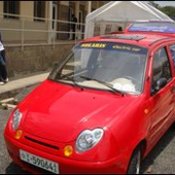Three African countries recently made great strides in the field of
technology, scientific research and politico-military decisions. They are Rwanda, Ethiopia
and Senegal.
 The news might have gone unnoticed in many African forums and news organisations
which are more overwhelmed with the terrific management by African neo-colonial
rulers in general. "Hey alas", this is something worth talking about because it
is far from the wars, famine, embezzlement that many are used to.
The news might have gone unnoticed in many African forums and news organisations
which are more overwhelmed with the terrific management by African neo-colonial
rulers in general. "Hey alas", this is something worth talking about because it
is far from the wars, famine, embezzlement that many are used to.
It began with Rwanda, which recently launched its first bio-diesel bus in the last week of March, 2010. The bus developed in three years by Rwandan Institute of Scientific and Technological Research, runs on oil plants, animal fat and cooking oil. It is an environmental friendly achievement through cooperation with the Swedish Scania company.
This was followed by Ethiopia which released its first two versions of electric cars called Solaris Elettra. The East African country is the second African nation after South Africa to have delved into such a technical venture. The two different types which are being produced by the Freestyle PLC are expected to cost between 12000 and 13000 US dollars and are supposed to be powered by a generator or any solar power. This will not only make them environmental friendly, but equally would be cheaper to manage. The price of the car certainly sounds exorbitant for the average Ethiopian but it expected that with time cost would be reviewed relation to production cost.
According to an interview granted the BBC, the chairman of the company Carlo Pironti said they would eventually export the cars to other parts of Africa and to Europe. In October 2007 , Ethiopia also released another car, Abay, manufactured in Modjo near Addis Ababa by Holland Car Plc; a company owned 50 % by Dutch Trento and 50% by Holland Car Ethiopia.
Away from science and technology, Senegal continued the trail early April as President Abdoulaye Wade announced that Senegal was taking over full control of all military bases in the country previously under French occupation. This was on the occasion of Senegal’s 50 years of “independence" from France. The agreement reached by between France and Senegal in February, equally paves the way for all French forces in that country to leave before the end of 2010.
The presence of French troops in “former” colonies has been described by many as tactics of intimidation, the undermining African sovereignty and part of French strategy to assist dictators and continue the pillage of African resources. It would also be recalled that while Cameroon auctioned it seaport to the French group, Bollore, Senegal refused to do so.
Ethiopia and Rwanda both landlocked and non oil dependent nations are two countries that many Cameroonians will not even think anything positive can come from there. What most Cameroonians know of Ethiopia are the past wars and famine that once hit the country (many think it is still ongoing) as well as it numerous conflict with Eritrea. As for Rwanda, many cannot think of anything beyond the Rwandan genocide. However, these two countries are writing history and are among the fastest growing economies in Africa according to World Bank . Rwandan even recorded double digits, 11% growth rate in 2008.
CAMEROON
Proponents of political and economic mediocrity in Cameroon have always hinged on the fact that Cameroon has been a “peaceful” country but ironically, a supposedly peaceful country that has been taken economically and politically hostage by a handful of aristocrats who rely on the barrel of the gun, embezzlement, intimidation, injustice and manipulation for survival. The move by Ethiopia and Rwanda, whose regimes equally have their own shortcomings, is worth emulating by the Cameroonian government.
Nevertheless, in the last week of March 2010, the Cameroon government signed a deal with China that is suppose to see the manufacturing of Chinese buses in Cameroon. Sceptics opine that the ground work for the manufacturing of such buses which are suppose be preceded by goods roads, power supply, communication facilities etc have not been laid. That notwithstanding, it is expected that the Cameroon government would do everything possible to put the things in place before the end of the year, which the project is supposed to start. Many people continue doubt because the announcement of the project seems to coincide with presidential elections due in 2011. Besides, other announced projects like the South Korean cement factory in Limbe, the Limbe Deep Sea ports among others have never materialised.
The developments in Rwanda and Ethiopia should ring a bell to the Cameroon government and most especially to the officials of the School of engineering (POLYTECHNIC). This is an institution which decades after its creation can only churn out academicians who have not been able to prove their worthwhile practically. IRAD is not different. Despite the hype on its activities average Cameroonians farmers still do not really know what the institution really stands for. Let Cameroonians engineers and technologists remain in the workshop, let scientists, surgeons and medical doctors go to the laboratory, theatres and research centres. Let professors remain in the classrooms, let economists and managers handle our economy, let politicians and leaders think of the welfares of their people. Let police forget about “managing money on the road” and focus on internal security, let judges and magistrates forget about money and apply nothing other than the law etc etc. The tendency for everybody to struggle being in a position to control a budget has turned Cameroon to a banana republic.
